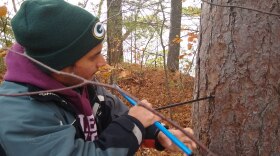An amphibious vehicle called an Argo has eight wheels, two treads, floats on water, and can go just about anywhere.
Has Noah Lottig found a place it can’t access?
“Not yet. We’ve tried. We have not found a place where this will not go yet,” said Lottig, an assistant scientist at the UW-Madison Trout Lake Station in Boulder Junction.
A fifteen-minute ride on the Argo allows Lottig and two graduate students to access an undeveloped, frozen bog near Sparkling Lake in Vilas County. Lottig has been here plenty with the Argo, hooking a snowplow to its front.
“Within 24 hours of a one-inch-or-greater snowfall happening, we’re out here with snowblowers and plows and clearing all the snow off the lake to simulate what a lake might experience if we didn’t experience winter as we know it now,” he said.

Clearing snow is the closest Lottig and fellow researchers can get to a completely ice-free winter lake. Both let plenty of sunlight through to the water underneath.
The project is a response to a changing climate.
Historical records show, over the last century, some lakes in Wisconsin have lost an average of one month of ice cover in the winter. Scientists don’t expect that trend to change. Northwoods researchers intend to figure out what the loss of lake ice could mean for the health of the waters in our region and for the aquatic life inside them.
On the way to those conclusions, Lottig and Hilary Dugan are countering the assumption that little of consequence occurs in lakes in the winter.

“That’s definitely what is the long-held status quo is that there’s not a lot happening, it’s not important in terms of the annual, the big picture,” said Dugan, an assistant professor at the UW-Madison Center for Limnology. “[The old idea is] we can ignore winter, because things definitely slow down.”
Dugan says winter has been underexplored scientifically by limnologists, who study inland lakes.
That’s beginning to change, in part thanks to people like graduate student Adrianna Gorsky, who’s working on the project in Vilas County.
“There’s really this battle cry for more research as our winters are changing and they’re changing more rapidly,” Gorsky said.
Gorsky was kneeling over an auger-drilled hole in the ice on the project site, taking readings of lake temperature and dissolved oxygen. She’s a long way from her Virginia home, but she’s doing the research for a clear reason.
“This is the first time I’ve ever stepped out on any sort of body of water in the wintertime. That, in itself, was sort of mind-blowing for me,” Gorsky said with a laugh. “I would hope this story says something and we can learn from it for the future.”

The story Gorsky, Dugan, and Lottig are studying deals with the future of winters, which are becoming shorter and more variable.
We could be heading toward winters with less lake ice cover or perhaps no ice cover at all.
“Imagine we have a winter up here where we don’t have lake ice. Some crazy winter. What impact does that have? Is that going to have ripple effects throughout the summer? We really don’t have a good answer for that right now,” Dugan said. “Those are sort of those fundamental questions that we’re trying to work on.”
To get at the answers to those questions, researchers can’t keep a sizeable lake clear of ice. It’s simply not logistically feasible.
But the next best thing is clearing a lake of snow, simulating the same amount of sunlight reaching the water below.
“What we’re trying to do is just change that light regime in the bog to understand how that light penetration cascades through the food web,” Dugan said.
More light likely means more winter algae growth. Zooplankton eat the algae, setting off impacts for even larger species, perhaps altering the nutrient, greenhouse gas, and aquatic life makeup of lakes.
Those impacts could be the same as if there were less winter ice, or no ice at all, on future Northwoods lakes.

“If we think about, here in the Northwoods, what defines winter, is frozen lakes [and] snow. Those are sort of the defining characteristics of winter, and we’re losing that,” Lottig said. “Future projections and models have suggested that even with relatively small increases in temperature, we could see a loss of permanently ice-covered lakes, which are sort of a hallmark of the area that we live in.”
Measurements taken through the auger-drilled hole help the team monitor temperatures, gases, and living things under the snow-free ice. A permanent device under the ice is also constantly taking readings.
Dugan knows it sounds a bit crazy to clear a few acres of snow from a lake all winter.
But, she says, how can we figure out how to plan for the future without being a little creative in the present?
“It’s one of many science projects where people probably look at you and think you’re wasting your time. But that’s how interesting discoveries are made, right? People do things that are unexpected.”






